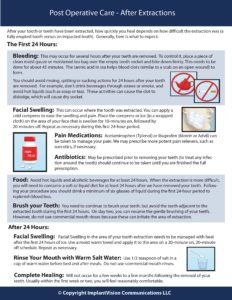 After your tooth or teeth have been extracted, how quickly you heal depends on how difficult the extraction was (a fully erupted tooth versus an impacted tooth). Generally, here is what to expect:
After your tooth or teeth have been extracted, how quickly you heal depends on how difficult the extraction was (a fully erupted tooth versus an impacted tooth). Generally, here is what to expect:
The First 24 Hours:
Bleeding: This may occur for several hours after your teeth are removed. To control it, place a piece of clean moist gauze or moistened tea bag over the empty tooth socket and bite down firmly. This needs to be done for about 45 minutes. The tannic acid in tea helps blood clots (similar to a scab on an open wound) to form.
You should avoid rinsing, spitting or sucking actions for 24 hours after your teeth are removed. For example, don't drink beverages through straws or smoke, and avoid hot liquids (such as soup or tea). These activities can cause the clot to dislodge, which will cause dry socket.
Facial Swelling: This can occur where the tooth was extracted. You can apply a cold compress to ease the swelling and pain. Place the compress or ice (in a wrapped cloth) on the area of your face that is swollen for 10-minutes on, followed by 20-minutes off. Repeat as necessary during this first 24-hour period.
Pain Medications: Acetaminophen (Tylenol) or ibuprofen (Motrin or Advil) can be taken to manage your pain. We may prescribe more potent pain relievers, such as narcotics, if necessary.
Antibiotics: May be prescribed prior to removing your teeth (to treat any infection around the tooth) should continue to be taken until you are finished the full prescription.
Food: Avoid hot liquids and alcoholic beverages for at least 24 hours. When the extraction is more difficult, you will need to consume a soft or liquid diet for at least 24 hours after we have removed your teeth. Following your procedure you should drink a minimum of six glasses of liquid during the first 24-hour period to replenish blood loss.
Brush your Teeth: You need to continue to brush your teeth, but avoid the teeth adjacent to the extracted tooth during the first 24 hours. On day two, you can resume the gentle brushing of your teeth. However, do not use commercial mouth rinses because these can irritate the area of extraction.
After 24 Hours:
Facial Swelling: Facial Swelling in the area of your tooth extraction needs to be managed with heat after the first 24 hours of ice. Use a moist warm towel and apply it to the area on a 20-minute on, 20-minute off schedule. Repeat as necessary.
Rinse Your Mouth with Warm Salt Water: Use 1/2 teaspoon of salt in a cup of warm water before bed and after meals. Do not use commercial mouth rinses.
Complete Healing: Will not occur for a few weeks to a few months following the removal of your teeth. Usually within the first week or two, you will feel reasonably comfortable.
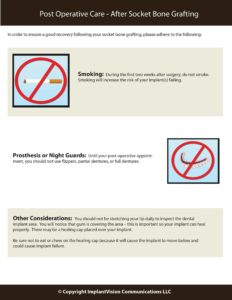 In order to ensure a good recovery following your socket bone grafting, please adhere to the following:
In order to ensure a good recovery following your socket bone grafting, please adhere to the following:
Smoking: During the first two weeks after surgery, do not smoke. Smoking will increase the risk of your implant(s) failing.
Prosthesis or Night Guards: Until your post-operative appointment, you should not use flippers, partial dentures, or full dentures.
Other Considerations: You should not be stretching your lip daily to inspect the dental implant area. You will notice that gum is covering the area – this is important so your implant can heal properly. There may be a healing cap placed over your implant.
Be sure not to eat or chew on the healing cap because it will cause the implant to move below and could cause implant failure.
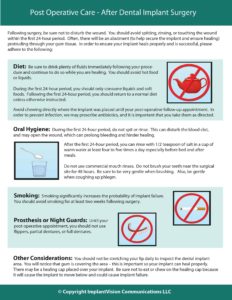 Following surgery, be sure not to disturb the wound. You should avoid spitting, rinsing, or touching the wound within the first 24-hour period. Often, there will be an abutment (to help secure the implant and ensure healing) protruding through your gum tissue. In order to ensure your implant heals properly and is successful, please adhere to the following:
Following surgery, be sure not to disturb the wound. You should avoid spitting, rinsing, or touching the wound within the first 24-hour period. Often, there will be an abutment (to help secure the implant and ensure healing) protruding through your gum tissue. In order to ensure your implant heals properly and is successful, please adhere to the following:
Diet: Be sure to drink plenty of fluids immediately following your procedure and continue to do so while you are healing. You should avoid hot food or liquids.
During the first 24-hour period, you should only consume liquids and soft foods. Following the first 24-hour period, you should return to a normal diet unless otherwise instructed.
Avoid chewing directly where the implant was placed until your post-operative follow-up appointment. In order to prevent infection, we may prescribe antibiotics, and it is important that you take them as directed.
Oral Hygiene: During the first 24-hour period, do not spit or rinse. This can disturb the blood clot, and may open the wound, which can prolong bleeding and hinder healing.
After the first 24-hour period, you can rinse with 1/2 teaspoon of salt in a cup of warm water at least four to five times a day especially before bed and after meals.
Do not use commercial mouth rinses. Do not brush your teeth near the surgical site for 48 hours. Be sure to be very gentle when brushing. Also, be gentle when coughing up phlegm.
Smoking: Smoking significantly increases the probability of implant failure. You should avoid smoking for at least two weeks following surgery.
Prosthesis or Night Guards: Until your post-operative appointment, you should not use flippers, partial dentures, or full dentures.
Other Considerations: You should not be stretching your lip daily to inspect the dental implant area. You will notice that gum is covering the area – this is important so your implant can heal properly. There may be a healing cap placed over your implant. Be sure not to eat or chew on the healing cap because it will cause the implant to move below and could cause implant failure.
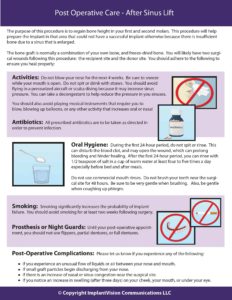 The purpose of this procedure is to regain bone height in your first and second molars. This procedure will help prepare the implant in that area that could not have a successful implant otherwise because there is insufficient bone due to a sinus that is enlarged.
The purpose of this procedure is to regain bone height in your first and second molars. This procedure will help prepare the implant in that area that could not have a successful implant otherwise because there is insufficient bone due to a sinus that is enlarged.
The bone graft is normally a combination of your own bone, and freeze-dried bone. You will likely have two surgical wounds following this procedure: the recipient site and the donor site. You should adhere to the following to ensure you heal properly:
Activities: Do not blow your nose for the next 4 weeks. Be sure to sneeze while your mouth is open. Do not spit or drink with straws. You should avoid flying in a pressurized aircraft or scuba diving because it may increase sinus pressure. You can take a decongestant to help reduce the pressure in you sinuses.
You should also avoid playing musical instruments that require you to blow, blowing up balloons, or any other activity that increases oral or nasal.
Antibiotics: All prescribed antibiotics are to be taken as directed in order to prevent infection.
Oral Hygiene: During the first 24-hour period, do not spit or rinse. This can disturb the blood clot, and may open the wound, which can prolong bleeding and hinder healing. After the first 24-hour period, you can rinse with 1/2 teaspoon of salt in a cup of warm water at least four to five times a day especially before bed and after meals.
Do not use commercial mouth rinses. Do not brush your teeth near the surgical site for 48 hours. Be sure to be very gentle when brushing. Also, be gentle when coughing up phlegm.
Smoking: Smoking significantly increases the probability of implant failure. You should avoid smoking for at least two weeks following surgery.
Prosthesis or Night Guards: Until your post-operative appointment, you should not use flippers, partial dentures, or full dentures.
Post-Operative Complications: Please let us know if you experience any of the following:
- If you experience an unusual ow of liquids or air between your nose and mouth.
- If small graft particles begin discharging from your nose.
- If there is an increase of nasal or sinus congestion near the surgical site.
- If you notice an increase in swelling (after three days) on your cheek, your mouth, or under your eye.
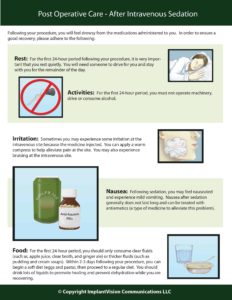 Following your procedure, you will feel drowsy from the medications administered to you. In order to ensure a good recovery, please adhere to the following:
Following your procedure, you will feel drowsy from the medications administered to you. In order to ensure a good recovery, please adhere to the following:
Rest: For the first 24-hour period following your procedure, it is very important that you rest quietly. You will need someone to drive for you and stay with you for the remainder of the day.
Activities: For the first 24-hour period, you must not operate machinery, drive or consume alcohol.
Irritation: Sometimes you may experience some irritation at the intravenous site because the medicine injected. You can apply a warm compress to help alleviate pain at the site. You may also experience bruising at the intravenous site.
Nausea: Following sedation, you may feel nauseated and experience mild vomiting. Nausea after sedation generally does not last long and can be treated with antiemetics (a type of medicine to alleviate this problem).
Food: For the first 24-hour period, you should only consume clear fluids (such as, apple juice, clear broth, and ginger ale) or thicker fluids (such as pudding and cream soups). Within 2-3 days following your procedure, you can begin a soft diet (eggs and pasta), then proceed to a regular diet. You should drink lots of liquids to promote healing and prevent dehydration while you are recovering.
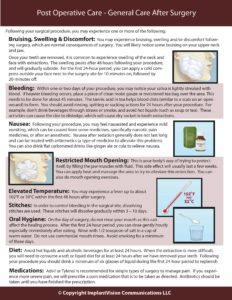 Following your surgical procedure, you may experience one or more of the following:
Following your surgical procedure, you may experience one or more of the following:
Bruising, Swelling & Discomfort: You may experience bruising, swelling and/or discomfort following surgery, which are normal consequences of surgery. You will likely notice some bruising on your upper neck and jaw.
Once your teeth are removed, it is common to experience swelling of the neck and face with extractions. The swelling peaks after 48 hours following your procedure, and will gradually subside. For the first 24-hour period, you can apply a cold compress outside your face next to the surgery site for 10-minutes on, followed by 20-minutes off.
Bleeding: Within one or two days of your procedure, you may notice your saliva is lightly streaked with blood. If heavier bleeding occurs, place a piece of clean moist gauze or moistened tea bag over the area. This needs to be done for about 45 minutes. The tannic acid in tea helps blood clots (similar to a scab on an open wound) to form. You should avoid rinsing, spitting or sucking actions for 24 hours after your procedure. For example, don't drink beverages through straws or smoke, and avoid hot liquids (such as soup or tea). These activities can cause the clot to dislodge, which will cause dry socket in tooth extractions.
Nausea: Following your procedure, you may feel nauseated and experience mild vomiting, which can be caused from some medicines, specifically narcotic pain medicines, or after an anesthetic. Nausea after sedation generally does not last long and can be treated with antiemetics (a type of medicine to alleviate this problem). You can also drink ‑at carbonated drinks like ginger ale or cola to relieve nausea.
Restricted Mouth Opening: This is your body’s way of trying to protect itself, by filling the jaw muscles with fluid. This side effect will usually last a few weeks. You can apply heat and massage the area to try to alleviate this restriction. You can also do mouth opening exercises.
Elevated Temperature: You may experience a fever up to about 102°F or 39°C within the first 48 hours after surgery.
Stitches: In order to control bleeding in the surgical site, dissolving stitches are used. These stitches will dissolve gradually within 3 – 10 days.
Oral Hygiene: On the day of surgery, do not rinse your mouth as this can affect the healing process. After the first 24-hour period, you can rinse gently hourly especially immediately after eating. Rinse with 1/2 teaspoon of salt in a cup of warm water. Do not use commercial mouth rinses. Avoid smoking for a minimum of three days.
Diet: Avoid hot liquids and alcoholic beverages for at least 24 hours. When the extraction is more difficult, you will need to consume a soft or liquid diet for at least 24 hours after we have removed your teeth. Following your procedure you should drink a minimum of six glasses of liquid during the first 24-hour period to replenish.
Medications: Advil or Tylenol is recommended for simple types of surgery to manage pain. If you experience more severe pain, we will prescribe a pain medication that is to be taken as directed. Antibiotics should be taken until you have finished the prescription.
